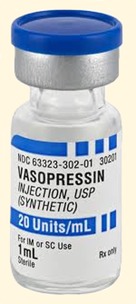
Vasopressin, also known as antidiuretic hormone, is a neurohypophysial hormone found in most mammals which is also used as a medication. In most species it contains arginine and is thus also called arginine vasopressin or argipressin. More
Vasopressin, also known as antidiuretic hormone, is a neurohypophysial hormone found in most mammals which is also used as a medication. In most species it contains arginine and is thus also called arginine vasopressin or argipressin.
Vasopressin
Arginine vasopressin; Argipresina; Argipressinum; 8-Arginine-vasopressin
Cpressin, Cpressin-P, Petresin, Vascel, Vasmed, Vasopin, Vpress
1-{[(4R,7S,10S,13S,16S,19R)-19-Amino-7-(2-amino-2-oxoethyl)-10-(3-amino-3-oxopropyl)-13-benzyl-16-(4-hydroxybenzyl)-6,9,12,15,18-pentaoxo-1,2-dithia-5,8,11,14,17-pentaazacycloicosan-4-yl]carbonyl}-L-p rolyl-L-arginylglycin
1% protein binding.
This is an antidiuretic hormone used for the prevention and treatment of diabetes insipidus, postoperative abdominal distention, and in abdominal roentgenography to dispel interfering gas shadows. This can cause contraction of smooth muscle of the GI (gastrointestinal) tract and of all over the parts of the vascular bed, especially the small arterioles, capillaries, and venules. It is also prescribed to treat extreme cases of bed wetting in children, to control bleeding in some forms of von Willebrand disease and this plays a role in memory formation although the mechanism is unknown.
5-20 units, IV or parenteral.
For the treatment of diabetes insipidus, enuresis, polydipsia, polyuria and oesophageal varices with bleeding.
Pallor, anaphylaxis; cardiac arrest or shock. Vomiting, tremour, belching, nausea, headache, abdominal cramps, fluid retention, vertigo, hypersensitivity reaction, hyponatraemia, urticaria, sweating, bradycardia, gangrene, arrhythmias, desire to defecate, angina, MI and bronchoconstriction.
Store between 15-25°C (59-77°F).
1084.232 Da
C46H65N15O12S2
11000-17-2